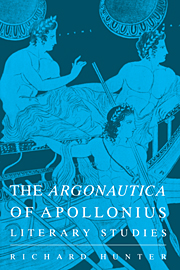Book contents
- Frontmatter
- Contents
- Preface
- List of abbreviations
- 1 Introduction
- 2 Modes of heroism
- 3 Images of love
- 4 The gods and the divine
- 5 The poet and his poem
- 6 The Argonautica and its Ptolemaic context
- 7 Argonautica and Aeneid
- Appendix: ἓν ἂισμα διηνκές: Aristotle, Callimachus, Apollonius
- Bibliography
- General index
- Index of passages discussed
6 - The Argonautica and its Ptolemaic context
Published online by Cambridge University Press: 02 December 2009
- Frontmatter
- Contents
- Preface
- List of abbreviations
- 1 Introduction
- 2 Modes of heroism
- 3 Images of love
- 4 The gods and the divine
- 5 The poet and his poem
- 6 The Argonautica and its Ptolemaic context
- 7 Argonautica and Aeneid
- Appendix: ἓν ἂισμα διηνκές: Aristotle, Callimachus, Apollonius
- Bibliography
- General index
- Index of passages discussed
Summary
As Librarian of the Royal Library, Apollonius occupied what was probably the principal position of academic patronage available to a Greek intellectual at Alexandria, and it is this social and academic context in which his epic must always be read, even if we cannot be completely certain of the circumstances of the poem's production. His lost poems of which we know something (though often only the title) – works on ‘foundations’ and on local history – fit well with a central area of the scholarly activity which centred on the Museum and Library; his prose works on archaic poetry (Homer, Hesiod, Archilochus) are also of a type very familiar in the history of third-century Alexandrian scholarship. In writing the Argonautica, Apollonius chose to deal with an area of the world – Colchis and the Black Sea – which was believed to have traditional racial and cultural links with Egypt, and which we know to have been of interest to the Ptolemies. Moreover, the epic is presented as a rewriting of Pindar's Fourth Pythian, a poem composed (like Pythian 5) for the victory of Arcesilas IV of Cyrene, who is said to have reorganised the colony at Euhesperides, the site of which Apollonius celebrates in Book 4; echoes of Pythian 4 open Books 1 and 3, and the last great sequence of Apollonius' poem closes with the foundation myth of Cyrene, with which Pindar had begun his poem.
- Type
- Chapter
- Information
- The Argonautica of Apollonius , pp. 152 - 169Publisher: Cambridge University PressPrint publication year: 1993



